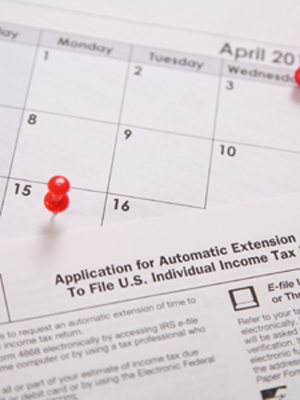
Ultimately the extension does not extend the time to make your tax payment; it only extends the amount of time to send in your paperwork. If you haven't paid at least 90% of the final amount due on your return by April 15th (or the legal due date), there will be fees and penalties for you to deal with.
There are a lot of misperceptions among taxpayers regarding the filing of an extension. All too many people believe an extension is a magic pass that allows them to stop worrying about any aspect of their tax responsibilities until they decide to get around to handling their taxes before the extension deadline (usually October 15th).
This is not true at all. Filing an extension does not mean you don't have to pay whatever amount you may owe. It only extends the filing deadline for the actual return (the paperwork). If you owe any money on April 15th you have to pay it on or before April 15th. Otherwise the IRS has the right to come after you for interest and possible penalties on whatever amount you owe when you finally get around to filing your return.
The problem for most performers is that they don't know year to year how much they might be owing on their return each year. you may have never had to make a payment with your retrun but depending on many factors. Actors usually don't make the same amount of money each year, they don't make it the same way year to year (W-2 versus 1099-MISC income), the amount of their deductions fluctuate year to year and so until they put all their tax information together the basic requirements of the extension form can't be filled out with any legitimacy. And filing a valid extension is very important.
The Extension form (Form 4868) demands three things to make the filing legitimate. It requires that you “estimate” your total tax liability for the previous tax year; show how much you have already paid in (through withholding and any estimated taxes you may have paid); determine the balance due and finally write down how much of the balance due you are paying with the Extension. If you haven't paid at least 90% of the final amount due on your return by April 15th (or the legal due date) the IRS has the right to deny your extension. If so there may be fees and penalties for you to deal with whether you filed an extension or not.
Again, the extension does not extend the time to make your tax payment; it only extends the amount of time to send in your paperwork.
POSSIBLE FEES AND PENALTIES FOR LATE FILING
If you don’t file your return on time (April 15th each year) the Internal Revenue Service can hit you with a late payment and a late filing penalty.
Late Payment Penalty
The late payment penalty is usually ½ of 1% of any tax (other than estimated tax) not paid by April 17, 2017. It is charged for each month or part of a month the tax is unpaid. The maximum penalty is 25%.
The late payment penalty will not be charged if you can show reasonable cause for not paying on time. Attach a statement to your return fully explaining the reason. Do not attach the statement to Form 4868.
You are considered to have reasonable cause for the period covered by this automatic extension if at least 90% of your actual 2016 tax liability is paid before the regular due date of your return through withholding, estimated tax payments, or payments made with Form 4868.
Late Filing Penalty
A late filing penalty is usually charged if your return is filed after the due date (including extensions). The penalty is usually 5% of the amount due for each month or part of a month your return is late. The maximum penalty is 25%. If your return is more than 60 days late, the minimum penalty is $135 or [an amount equal to] the balance of the tax due on your return, whichever is smaller. You might not owe the penalty if you have a reasonable explanation for filing late. Attach a statement to your return fully explaining your
Interest
You will owe interest on any tax not paid by the regular due date of your return, even if you qualify for the 2-month extension because you were out of the country. The interest runs until you pay the tax. Even if you had a good reason for not paying on time, you will still owe interest.
Note: The current IRS interest rate is 4% per year.
ADDITIONAL NOTE: Most states have their own extension forms and requirements you should also take into consideration if you are filing a Federal Extension.
Although you may be able to file a Federal extension electronically (and make any necessary payments you owe electronically as well) many states require you to mail the forms and payments the old fashioned way, with an envelope and a stamp, postmarked on no later than the deadline. Keep this in mind.
|


